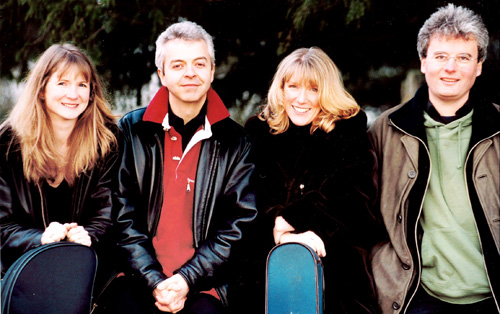 United Kingdom Haydn, Britten, Schubert: Emperor String Quartet [Martin Burgess, Clare Hayes (violins), Fiona Bonds (viola), William Schofield (cello)], Plymouth University Sherwell Centre 19.01. 2013 (PRB)
United Kingdom Haydn, Britten, Schubert: Emperor String Quartet [Martin Burgess, Clare Hayes (violins), Fiona Bonds (viola), William Schofield (cello)], Plymouth University Sherwell Centre 19.01. 2013 (PRB)
Haydn: String Quartet in D (‘The Lark’), Op 64 No 5
Britten: String Quartet No 1 in D, Op 25
Schubert: String Quartet in D minor (‘Death and the Maiden’), D 810

Almost from their inception, concerts, concert series, recitals, indeed musical events of all kinds have often relied on the generosity of rich noblemen or just interested and enthusiastic music-lovers for their patronage or financial support. In today’s difficult economic climate, such an important source of funding can be the difference between survival or simply going under.
For some sixteen years, chamber-music aficionados in Plymouth and the surrounding South East Cornwall and South West Devon countryside have been able to enjoy a concert series which was the envy of many conurbations twice the size. During that time, virtually every top chamber-music ensemble or exponent have played in the city – some on a number of occasions – by courtesy of the then Plymouth Chamber Music Trust.
While this was always a concerted effort from its trustees, one name emerges as the prime benefactor not only for this series, but also for a number of similar ones in the local area: Bryan Foster. Through the auspices of his Foster Charitable Trust he was largely responsible for the vital aspect of financial backing.
A former stockbroker, Bryan Foster sadly passed away early this month. He had, in fact, already agreed to sponsor this concert by the Emperor in the Peninsula Arts Chamber Music Series at Plymouth University – now almost the sole provider of chamber music in the area.
When the Quartet’s programme was agreed, some months back, no one realised then that the recital would, in fact, now be dedicated to the memory of Bryan Foster., one of whose greatest loves was Haydn. It was therefore felt almost obligatory to include a work by this composer in any event sponsored by the Trust. So it seemed especially apt that the evening should begin with Haydn’s Lark Quartet. From the opening soaring first-violin melody to the virtuosity of the breath-taking Finale here was a poised and balanced performance, marked by a great awareness of detail, and evidencing an almost flawless ensemble, notable for the lack of obvious gesturing that some other quartets seem obliged to include for its perceived added effect.
It has always been a tradition at this particular venue for artists freely to address the audience, which has the welcome effect of metaphorically breaking the ice as well as making chamber music – especially string-quartet playing – appear less precious and more encouraging to attract and then keep younger listeners.
Cellist William Schofield’s succinct but necessary few introductory words about Britten’s precocious First Quartet helped to clarify some of the composer’s intentions in a work which is perhaps not one of his more popular compositions. Again this was a well-studied and decidedly articulate reading, which highlighted another of the Emperor’s qualities – the individual strength and command of each player and their ability to dominate when needed, while never obtruding otherwise. In this the assertive power and projection from cellist Schofield was second to none.
Even if it is fairly common to open with a Haydn quartet, the choice of the closing work seemed strangely prophetic given the circumstances. Schubert’s Death and the Maiden Quartet was written towards the end of his life, following a serious illness and prolonged hospital stay, and the whole work – even in its sunnier moments – is permeated by a mood of fatality. Here again the Emperor’s impassioned reading captured every nuance of the writing – no small achievement given the almost icy conditions inside the venue – which was due not to the inclement weather outside, but simply a seemingly on-going fault of the climate-control system! This could have significantly affected the tuning – to say nothing of the players’ cold fingers.
All in all there could have been no finer tribute paid to Bryan Foster.
Philip R Buttall